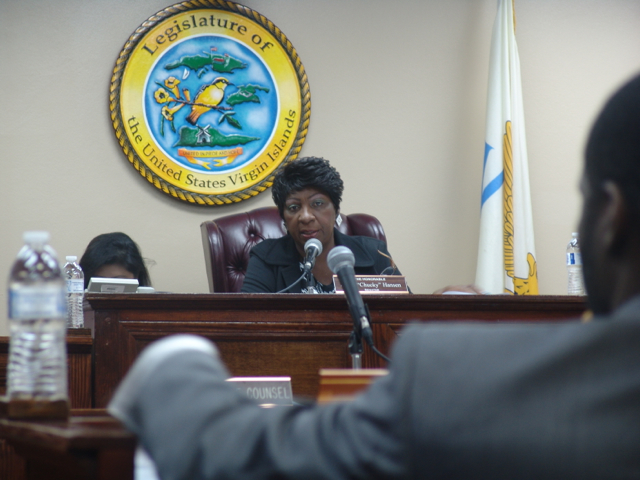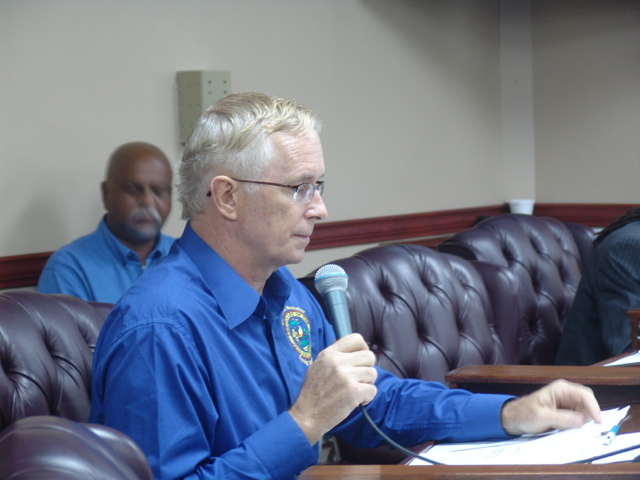
Barshinger’s bill was tabled, but not before the senator was harangued for failing to show proper deference to the chair, and threatened politically by another member of the committee. Barshinger had submitted a list of 20 witnesses he wanted to attend the session and testify about the bill, but Hansen’s office had called only one. When the hearing opened Wednesday Barshinger said he had taken it on himself to invite the witnesses, including David Hall, president of the University of the Virgin Islands, who were waiting in the Fritz Lawaetz Legislative Conference Room in Frederiksted.
Hansen erupted.
“You can’t invite anyone to come testify to my committee,” she said. “You cannot take the role of this chairperson. … No senator while I’m holding this position is going to run it for me. If we don’t call witnesses for a public hearing, you don’t go out and invite anybody.”
Hansen said Barshinger had only submitted the witness list two days earlier, and there were too many potential witnesses. The discussion would have lasted all day, she said. Barshinger tried to counter that he had submitted his list earlier, but Hansen repeatedly gaveled him down.
At one point, while Sen. Celestino White was speaking, Barshinger went into the audience to show different members of the media a letter requesting the witnesses, which he said had been hand-delivered to Hansen’s office and signed for by her staff on March 14 and again on May 4. Hansen gaveled him down again, referring to him as “Mr. Barshinger” instead of the usual collegial courtesy of “Sen. Barshinger,” and claiming that he was being rude and distracting while another senator spoke. White at that time was extolling the virtue of someone who is going to run against Barshinger and saying how much better the Senate will be when the at-large senator from St. John has been replaced.
Hansen said Barshinger thought no one would notice him being disrespectful to other senators because he is white and the rest of the committee members are black. A short time later Hansen, White and Sen. Alvin Williams carried on a five-minute whispered conversation while Sen. Terrence “Positive” Nelson was questioning the witness.
The bill itself came in for criticism before it was tabled, not for the idea of restructuring government to make it more effective and efficient, but because of the way Barshinger had phrased it.
The senator had made references to anecdotal stories of some government employees taking extended leaves of absence without cause, and others of some employees being paid though not working, or in some cases not even going to work.
Barshinger said these were issues that constituents have questioned him about and he responded by including them in the bill.
“It’s something that I don’t feel very comfortable doing,” he said.
Kenneth Hermon, director of the Division of Personnel, told the committee that much of what the bill calls for is already in process. The executive branch is involved in a five-step process to restructure the territorial government, he said. But the bill calls for the plan to be submitted within 30 days of the measure passing, while Hermon said such an effort, to be done properly, could take as long as two years.
He also objected to the anecdotal references. While commending Barshinger for the bill, he said, “I am concerned with some of the purported statement of facts, anecdotes and generalities included in several ‘whereas’ clauses that I believe are an unfair characterization of all government employees. I do not believe such statements should be codified in legislation.”
He flatly denied that any employees are receiving paychecks without even showing up for work.
“As director of Personnel, I am absolutely unaware of any employee being compensated unjustly,” he said. “As sworn members of this government, entrusted with maintaining the public trust, if any member of this body is aware of any circumstance outside of those which I have just identified it needs to be brought to my attention post haste so that swift corrective action can be taken.”
Excepted circumstances he mentioned included employees taking sick, compensatory or administrative leave, or an employee approved to take part in the donated leave program.
Several other senators also took exception to the inclusion of such anecdotes in the bill, but none more vociferously than Hansen.
Hansen claimed Barshinger was accusing all government employees of “thieving” from the government, although the bill says no such thing. The bill repeatedly refers to reports of “some” employees being paid without doing work, and also notes that many excellent employees cannot receive merit pay because of union contracts.
Nelson said the inclusion of those stories in the bill seemed as if the bill was blaming workers, but at the same time admitted he too hears such reports periodically. He suggested implementing a merit system, wherein employees are rewarded for good performance.

After the vote, Barshinger – who is not a member of the committee – asked to be recognized, but Hansen gaveled him down and proceeded with the meeting.
The committee approved a bill by Sen. Janette Millin Young calling on the executive branch to prepare a monthly report showing all new hires, and restricting government hiring to “essential” employees.
All senators agreed that the more information they have the better decisions they can make. Nelson suggested a definition of “essential” would be useful, but Hermon said it’s actually better to have flexibility, so that individual department heads can help determine what is essential in their departments.
The measure passed 6-0, with Millin Young absent.





